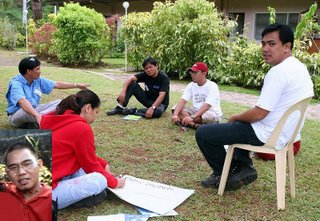
CAGAYAN de Oro City - (BEN BALCE / Nov. 18) - MISAMIS Oriental Gov. Oscar Moreno has said he doubts reports that 23 of the province’s mayors have thrown their support for the likely gubernatorial bid of 2nd district Rep. Augusto Baculio Jr., next year.
Moreno said this is in reaction to a claim made by a radio commentator of DxIF-Bombo Radyo that only Tagoloan Mayor Yevgeny Vincente Emano has remained a political ally of the governor.
“In politics, it’s always addition. But I don’t believe that (claim). Maybe three or four mayors are with him (Baculio) right now,” said Moreno, adding he, Emano and most of the other town mayors in the province were in good terms, and they have remained supportive his administration.
Baculio, who is serving his 3rd and last term as congressman, has reportedly declared that he would run for governor of the province in May next year.
Moreno said he would not stand in the way of a Baculio candidacy, adding that he understands that the congressman would be displaced unless he takes a shot at the gubernatorial post.
Moreno said he also realizes that the congressman’s staff and his supporters were prodding Baculio to seek the governorship because they, too, would be displaced unless the lawmaker runs for another elective position next year.
“Jun’s (Baculio’s) bid is the product of his staff and the people around him. Nabalaka na sila kung asa mopaingon,” Moreno said.
Moreno called Baculio, his classmate at San Beda in 1972, “a good man” which is why, he said, he has no problems with the lawmaker’s announcement to run for governor next year.
“I have nothing against him (Baculio) and I don’t even plan to do anything might block his candidacy,” said Moreno.
At least 17 municipal mayors from the province who were brought to the US by Baculio in October have pledged to support Baculio’s like bid next year, according to a DxIF report.
While it was for a Dairy Congress, the US trip was widely perceived as a move to woo the support of the town mayors.
In January, Baculio also brought a group of towns mayors to Thailand.
The trips were in line with efforts to make Misamis Oriental the country’s “dairy capital,” according to Baculio. He said the trips were “educational.”
“It’s a sign that there’s going to be an election next year,” Moreno said. “If Jun believes that he could serve better, I respect that, and it is only right for him to declare and file his certificate of candidacy.”
But over local radio, Moreno said he would face Baculio and other politicians who might challenge his likely reelection bid in a “gentleman’s way.”
“It’s still November but already the province’s politicians are talking, with much interest, about the forthcoming elections. I’m also very excited too,” admitted Moreno.
But he said he would rather focus on implementing his programs for the province.
Meanwhile, Moreno claimed that majority of the members of the provincial board have remained in tact and unwavering in their support for his administration despite the alleged demolition job supposedly involving two of its members, Henry Clyde Abbott and Alejo Olano, and what some journalists now refer to as the “Stronghold Group.”
The “Stronghold Group,” coined from a insurance company called Stronghold which Abbott runs, is one of the places where the people allegedly involved in the alleged smear campaign against Moreno have been meeting. The group includes controversial radio blocktimers Eddie Dangcal and Ronnie Waniwan.
“I am upset because these people are behind this demolition job which started in July,” Moreno said. “But the fundamentals are still there. The people who really work hard to rebuild and reform the province are still there, and I have nothing to worry about.”
Home








